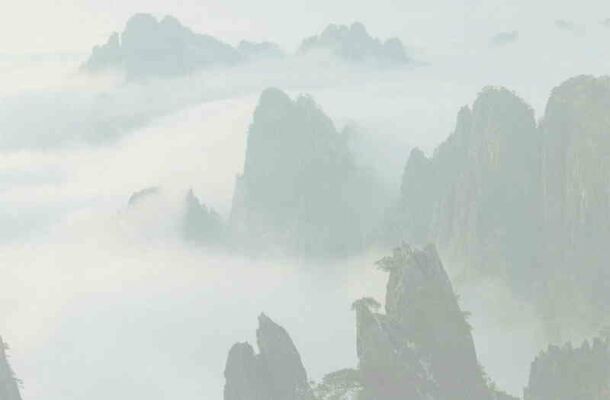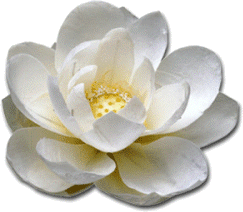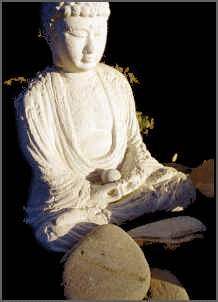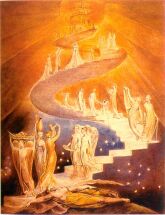Meditation

I. What is meditation?
![]() Meditation will provide material for meditation, if we just observe the observer.
Meditation will provide material for meditation, if we just observe the observer.
![]() Richard Rose
Richard Rose
![]() Meditation is the witnessing of experience. Participation in experience is dreaming.
Meditation is the witnessing of experience. Participation in experience is dreaming.
- Experience is binding.
Witnessing experience is liberating.
That which we take ourselves to be, the self, is our least witnessed experience. - Experience is born of the body-mind and is the process by which awareness becomes identified with that body-mind, giving rise to body-ego, then mental identity. In this sense then, it is experience that is the "Veil of Maya."
- Observation of experience is a process of dis-identification with the body-mind. It is a peeling away of the layers. It is a retreat from, or a discovery of, that which we are not.
- Observation of our experience of self leads to complete dissociation of awareness with that self. What remains when that self is witnessed as an experience is the real being.
- All of our experience occurs through the filter of self; therefore observation of experience is observation of the self. This is the same as asking the question "Who am I?"
- To know who and what one is, it is only necessary to look at what remains when
one's life is gone.
 Bob Cergol
Bob Cergol

![]() "Meditation: It's not what you think..." (part 1). Two
types of meditation work together and lead to Self knowledge: intellectual effort—to identify our true self,
and effortless meditation—sinking into transcendental consciousness. Doing both alternately is very
reinforcing and leads to full Realization. Examples of effortful
meditation (part 2) and effortless meditation: A practice of
"letting go" (part 3).
"Meditation: It's not what you think..." (part 1). Two
types of meditation work together and lead to Self knowledge: intellectual effort—to identify our true self,
and effortless meditation—sinking into transcendental consciousness. Doing both alternately is very
reinforcing and leads to full Realization. Examples of effortful
meditation (part 2) and effortless meditation: A practice of
"letting go" (part 3).
![]() Michael Conners
Michael Conners
![]() What is meditation? Let's first play a little game, but you have to be honest. It won't hurt, at least
not at first. You just need to answer a few simple questions.
What is meditation? Let's first play a little game, but you have to be honest. It won't hurt, at least
not at first. You just need to answer a few simple questions.
- Where are your hands? Put your attention into your hands, right now. Can you feel them?
- Good, now look inside your head.
- Can you hear your inner voices talking? Who talks, and who hears?
- Where do you see/hear these thoughts? Where do they come from?
- If one of these thoughts causes pleasure or pain, where does that take place?
- Now, who sees the thought, and feels the pleasure/pain?
There, you've successfully meditated. Carry on, go within, and good luck.
![]() Bob Fergeson
Bob Fergeson
![]()
 Any product of thought is not proper meditation, as that is of the mind's memory. Meditation is a total
denial, a total negation of everything that mankind has created. To meditate is to refuse all postures, breathing exercises,
all things set in motion by thought. Meditation is the total comprehension of the whole of existence, the place from which
correct action flows. Meditation is absolute silence of mind—not relative silence (lack of noise), but absolute silence
(lack of self). Order, projection, structure, all silenced. Such is true freedom. Only in that total and complete silence do
we abide in truth. A position where time no longer exists—an everlasting beginning and end.
Any product of thought is not proper meditation, as that is of the mind's memory. Meditation is a total
denial, a total negation of everything that mankind has created. To meditate is to refuse all postures, breathing exercises,
all things set in motion by thought. Meditation is the total comprehension of the whole of existence, the place from which
correct action flows. Meditation is absolute silence of mind—not relative silence (lack of noise), but absolute silence
(lack of self). Order, projection, structure, all silenced. Such is true freedom. Only in that total and complete silence do
we abide in truth. A position where time no longer exists—an everlasting beginning and end.
![]() Gary Harmon
Gary Harmon
![]() To meditate is to think with a goal in mind. Some may meditate on money or murder. Regardless, the goal
is discovery—the answering of a question that will not leave us in peace until it is resolved. Meditation is scientific
inquiry, and the outstanding scientists use logic and intuition to solve their mysteries. The scientist forms a question,
researches what others have found, uses the best tools available, and is not afraid to admit they were wrong. To
reach the highest goal, the discovery of one's true nature, requires scientific logic and scientific intuition.
To meditate is to think with a goal in mind. Some may meditate on money or murder. Regardless, the goal
is discovery—the answering of a question that will not leave us in peace until it is resolved. Meditation is scientific
inquiry, and the outstanding scientists use logic and intuition to solve their mysteries. The scientist forms a question,
researches what others have found, uses the best tools available, and is not afraid to admit they were wrong. To
reach the highest goal, the discovery of one's true nature, requires scientific logic and scientific intuition.
 Photo: Phil Franta
Photo: Phil Franta
Who? what? where? when? how? why? are the topics of inquiry and meditation. We try to answer these questions with research and logic. Yet, the honest person is plagued by the shadow of doubt. We find that our minds are unreliable. We hallucinate, desires cloud our judgment, we assume, pre-judge, discriminate. A host of influences (cultural, psychological, and physiological) determine what we see and think, and we are rarely conscious of these influences. The lack of certainty regarding all that the mind perceives leads us to meditate on the nature of the mind. What is this flawed glass out of which we peer?
To meditate is to strip the mind to its foundation in search of certainty. We find that all is in doubt except our awareness. We are aware of events in an apparently outer world of things and an inner world of our private drama. We are aware of thoughts. Yet, logic tells us that even awareness may have another side. Everything the mind witnesses has a flip side. There is awareness and not-awareness. Yet, we cannot conceive of not-awareness.
We look for that which is behind awareness, because there is no where else left to look. All other roads have been explored or rejected. Our heart tells us the answer is there, behind the mind.
To meditate is to ask questions, to think, to be honest about what we see, to listen to our intuition, and to
desire an answer to our deepest questions. To meditate is to be honest about what we see outside and inside and reject
what is less true.
![]() Shawn Nevins
Shawn Nevins
![]()
II. The Psychology of the Observer
 Meditation is one aspect of the threefold path recommended by Richard Rose. It corresponds to the "way" of the
Way, the Life and the truth mentioned by Jesus and to the "dharma" of the Buddha, the Dharma and the Sangha
taught by Gautama Buddha.
Meditation is one aspect of the threefold path recommended by Richard Rose. It corresponds to the "way" of the
Way, the Life and the truth mentioned by Jesus and to the "dharma" of the Buddha, the Dharma and the Sangha
taught by Gautama Buddha.
![]() While advice on meditation occurs throughout his writings, the
Meditation booklet is a good place to start.
While advice on meditation occurs throughout his writings, the
Meditation booklet is a good place to start.

![]() If you like learning by listening, TAT Foundation videos of Richard Rose's and others' talks
provide material for gaining an impression of a common-sense approach to the spiritual search. The video, Mister
Rose, captures a trip by a group of students from Raleigh, NC and their first meeting with this remarkable man.
If you like learning by listening, TAT Foundation videos of Richard Rose's and others' talks
provide material for gaining an impression of a common-sense approach to the spiritual search. The video, Mister
Rose, captures a trip by a group of students from Raleigh, NC and their first meeting with this remarkable man.
![]() For the serious pursuit of studying the mind with the mind, with the objective of removing the veil that's obscuring the
recognition of the innermost Self or essential Being, the
Psychology of the Observer is an invaluable resource. It combines a paper on Psychological Directions,
where Rose lays out the triangulation process by which the seeker climbs "Jacob's Ladder," the transcript of a University
Lecture that reaches out directly to the intuition or heart of the listener, and a Practical Approach that discusses the personal
struggle that anyone making the effort to really find himself may go through.
For the serious pursuit of studying the mind with the mind, with the objective of removing the veil that's obscuring the
recognition of the innermost Self or essential Being, the
Psychology of the Observer is an invaluable resource. It combines a paper on Psychological Directions,
where Rose lays out the triangulation process by which the seeker climbs "Jacob's Ladder," the transcript of a University
Lecture that reaches out directly to the intuition or heart of the listener, and a Practical Approach that discusses the personal
struggle that anyone making the effort to really find himself may go through.
![]() Read an outline of the Threefold Path.
Read an outline of the Threefold Path.
![]() Read an essay on Jacob's Ladder:
A Direct Going Within.
Read an essay on Jacob's Ladder:
A Direct Going Within.